Review of WWE: McMahon (2 Discs)
Introduction
The life of Vincent Kennedy McMahon has been, if nothing else, a full one. Born in 1945 in North Carolina, McMahon (known at the time as Lupton, his mother`s maiden name) didn`t meet his biological father, owner of World Wide Wrestling Federation, until he was twelve. By the age of twenty-five, Vinnie (the name by which he was always known, since his father was also Vincent) was promoting his own wrestling shows and providing commentary for his father`s television broadcasts.
In 1983, Vincent sold Titan Sports - parent company of the now re-named World Wrestling Federation - to his son. Vinnie - hitherto referred to as Vince - also bought the remaining stock from his father`s partners to gain full control of the company.
Noting the increasing ability of television to project to worldwide audiences, Vince decided to expand from New York (where his father had always promoted) to other areas of the country, much to the chagrin of other promoters, all of whom had a verbal agreement not to promote shows in someone else`s territory. When Hulk Hogan joined the WWF from Verne Gagne`s American Wrestling Association, and took the WWF Title from the Iron Sheik on 23rd January 1984, Vince promoted him as a major mainstream star. The company never looked back, and fifteen years later, McMahon was a legitimate billionaire.
"McMahon" is a 2-disc DVD set delving into the life of both Vince McMahon, and his alter ego, the television persona known as Mr McMahon, offering a comparison between the two. There is a full second disc of extras, with matches involving McMahon, including against "Nature Boy" Ric Flair, The Undertaker, and Hulk Hogan.
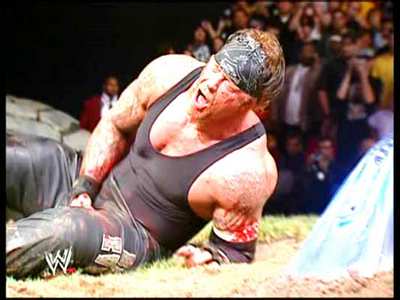
Video
Video is presented in 4:3 fullscreen PAL and is excellent for a DVD of this genre. The new interview footage with the likes of the McMahon family, Hulk Hogan, The Big Show and JBL looks very good, and even the dips into the WWE archives (way back into the late 70s and early 80s) are of outstanding quality considering both their budget and their date of recording.
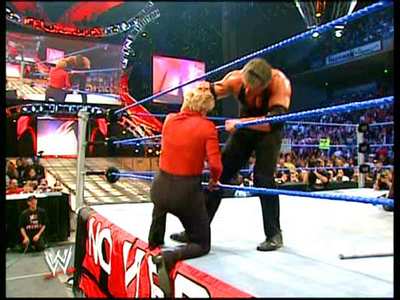
Audio
Audio is presented in Dolby Digital 2.0 and is very good for a DVD of this genre. Generic music is used to back up the documentary, and whilst it is a little bland, it doesn`t take away anything from the feature itself, and at no point does it overshadow what is being said.
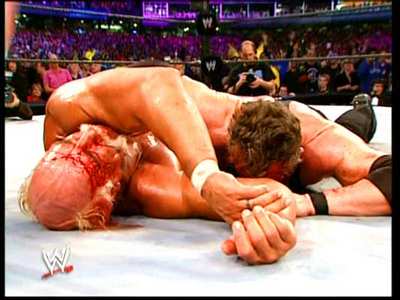
Features
As we have come to expect from WWE releases, the extras features on this set are bountiful. On Disc One, there is a collection of deleted scenes from the documentary - some of which are very interesting - as well as several stories told by the DVD`s participants. Also here is the first match between McMahon and perennial nemesis "Stone Cold" Steve Austin from 13th April 1998, as well as hilarious footage of Vince`s singing performance at the 1987 Slammy Awards - where he does his best Tom Jones impression - and of him training for the Austin match a la Rocky Balboa.
On Disc Two, we have a further eight matches involving McMahon. First off, he has a rematch with Austin, this time in a cage match from the St. Valentine`s Day Massacre pay-per-view. He then tags up with his son Shane to face "Stone Cold", this time in a ladder match from King of the Ring 1999, in which the winner would gain "control of the WWF".
In a match from Armageddon 1999, McMahon then faced real-life son-in-law Triple-H (actually, Paul "Triple-H" Levesque did not marry Stephanie McMahon until 2003) in a no-holds barred match. He then battled Shane McMahon at Wrestlemania XVII in a bizarre match which involved the whole McMahon clan, before facing "Nature Boy" Ric Flair at 2002`s Royal Rumble.
Two months later, at Wrestlemania XIX, McMahon squared off against the man that he - for television purposes, at least - claimed he "made", Hulk Hogan, before the ridiculousness kicked in again as he tangled with daughter Stephanie McMahon in an "I Quit" match where Stephanie`s job as General Manager of Smackdown was on the line against Vince`s ownership of the WWE.
In the final bout of the DVD, McMahon faced The Undertaker at Survivor Series 2003 in a Buried Alive match, in which the winner - shockingly! - is he who buries his opponent alive.
Whilst most of the matches here - especially the Austin vs McMahon matches - do have entertaining qualities about them, they are not exactly classics. Indeed, it is the strength of the crowd`s reaction, as well as the brutality of the matches, that make them so memorable. Watching all of these matches back-to-back is not recommended; it is with repeated viewing that you notice how limited the matches really are.
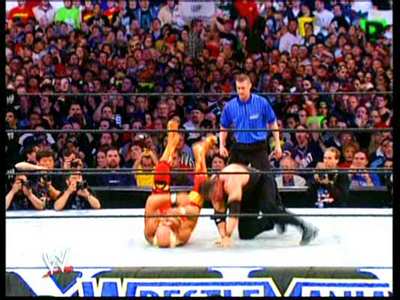
Conclusion
It has often been said that in professional wrestling, a good television persona is simply an extension of that person`s own real-life character. So - as difficult a task as it might be - if this documentary was meant to separate Vince McMahon from Mr McMahon, could it possibly achieve its goal?
The two-hour main feature begins promisingly, speaking of how McMahon took the regional (New York) WWF across the entire United States, using Hulk Hogan - whose star had risen tremendously from an appearance in Rocky III - as the company`s flag-bearer. It then recounts McMahon`s first run-in with TV mogul Ted Turner - who Vince believed tried to put him out of business in the 1990s - before inexplicably jumping twelve years to 1997`s Survivor Series, when he, going against the script, fired Bret Hart on live television.
The latter incident was the birth of the Mr McMahon character, and much of the remainder of the documentary is a profile of that character, with real-life excerpts of the real McMahon - such as making the WWF a PLC, and the failed XFL American Football league - thrown in.
The line of definition between Vince and Mr McMahon becomes more and more blurred, the further into the feature you delve. Whilst an effort is made to distinguish between the two, in your own mind you have to ask why would Vince - the businessman - allow his television shows to contain scenes of necrophilia, miscarried pregnancies, and incest. The Mr McMahon character might be morally reprehensible, but you could validly argue that Vince is worse, given that the decisions he has made about his programming are real-life decisions.
Away from that, it would have been nice had the documentary covered the biggest story of McMahon`s life, which was the Federal indictment he received in 1993, charged with possession of steroids and conspiracy to distribute steroids. He was found not guilty, but Vince`s story cannot be complete without what must have been the most challenging time of his life.
Unfortunately, the DVD is also littered with historical inaccuracies here, or at least some flagrant bending of the truth. In the initial segment on how McMahon took his company to a national audience, he claims that he made offers to the other regional promoters to buy their territory. This is not true, as alluded to here by Greg Gagne, whose promoter father was forced to declare himself bankrupt in the aftermath of McMahon`s aggressive marketing. Also, regarding the Bret Hart Survivor Series incident, it is suggested that Bret had refused to lose the WWF Title, and that Vince had to somehow find a way to take it from him. This too, is not true, but this is Vince`s documentary, so I guess he can say what he likes. And these are not the only debatable "facts".
Overall, the documentary suffers from not being one thing, nor the other. It is neither an intelligent, factual documentary about Vince`s life, nor a straight-out history of the Mr McMahon character. There are moments of interesting information, and some excellent archive footage, but the fact that the feature is led by clips from WWE TV shows should give you the idea that this DVD is much more about Mr McMahon than it is Vince McMahon. And that is not a good thing.
As McMahon himself puts it, "How much of that was Vince McMahon, and how much was Mr McMahon? Sometimes, I don`t even know."
Neither do I, Vince. Neither do I.
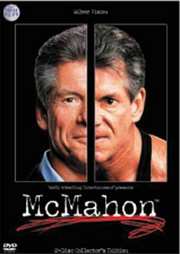




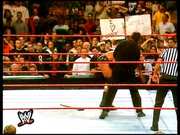
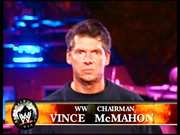
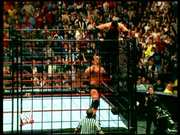
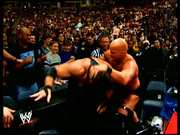
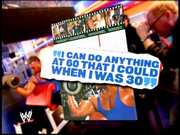
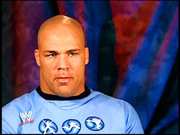
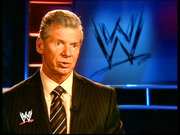
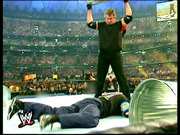
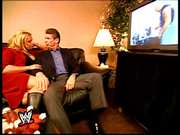
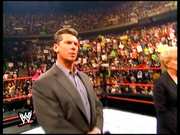
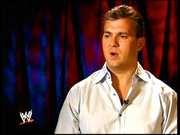
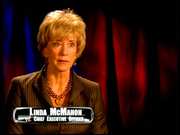
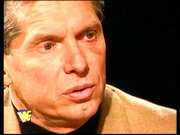
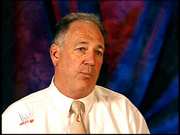
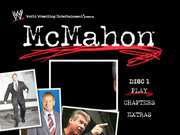
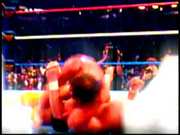
































Your Opinions and Comments
Be the first to post a comment!